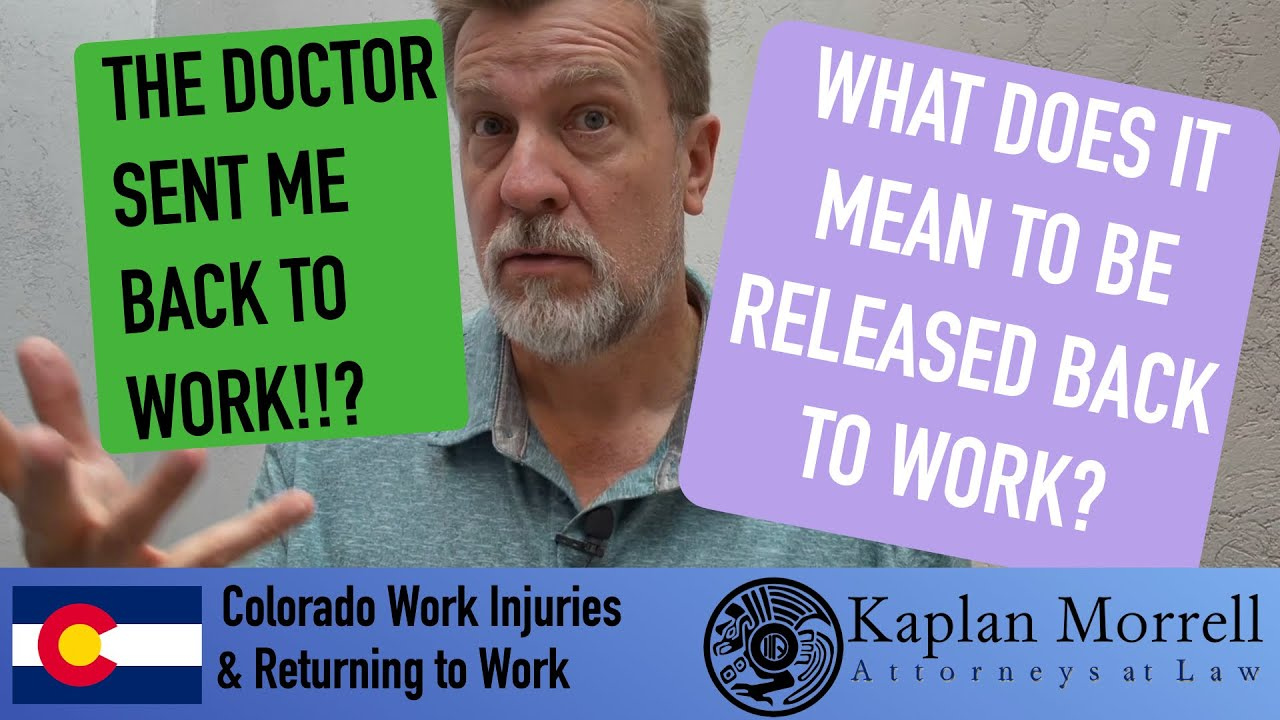What Does it Mean to be Released Back to Work? – Today we’re going to talk about what happens when the doctor releases you back to work after you’ve been injured on the job. What does that mean? How do you know what your work restrictions are and how can they affect you? What are your options? Let’s dive into it.
What Does it Mean to be Released Back to Work?
Restrictions on injured workers
When you’re seriously injured on the job, there’s a lot you’ll have to deal with. In addition to meeting with doctors and figuring out your medical care, it’s also likely that you won’t be able to work the same way you used to. The workers’ compensation system looks at this and they’ll want to know your doctor ordered restrictions. If your work injury happened in Colorado, the chances are, you’re getting medical treatment from a doctor who specializes in occupational medicine. They know at the end of every visit to give you restrictions. The restrictions might be; “Don’t lift more than 5 or 10 pounds, no pushing, no pulling more than 30 pounds.” Sometimes they get specific and might say that you can’t lift from the floor to the waist, etc. All of those things are called your work restrictions.
Have open communication with your doctor
If you’ve been released back to work, you need to first ask the doctor, “Am I being released back to work with restrictions or without restrictions?” If the doctor says without restrictions, then it’s time to talk about whether or not you feel capable of going back to unrestricted duty at all. If the doctor says, “I’m releasing you back to work but with restrictions,” then find out what those restrictions are. It’s a very common thing for injured workers to tell me, “Oh, my restrictions are that I can’t lift anything heavy.” Well, what does ‘heavy’ mean? Heavy to one person may mean 200 pounds. For a two-year-old child anything over 15 pounds is heavy. Get very specific in understanding what your restrictions are.
Should I tell my employer about my restrictions?
Some injured workers have also asked, “Do I have to tell my employer about my restrictions?” Our personal answer is, yes you should. You should tell them, “Here are my restrictions. Here’s the plan.” Communicate with your employer just as you would want them to communicate with you if for some reason they couldn’t operate normally. Show them the restrictions and ask them, “Do you have work within these restrictions?” Then your employer has a choice to accommodate your restrictions and bring you back to work. If they decide not to bring you back, then the insurance company should be paying you two-thirds of your lost wages. These are called temporary disability benefits.
Going back to work with an injury
It is not the end of the world to be released back to work when you have a work injury in Colorado. Statistics show injured workers who go back to work and are working modified duty tend to do better. It gets you out of the house. It keeps you active. It keeps you connected with your employment and that’s a great thing. That’s why it’s important to communicate with your employer. See if there’s modified work available that you can do. If your employer doesn’t have work for you, don’t worry, the insurance company will still have to pay two-thirds of lost wages.
We’re here to help
If you or someone you know has been injured on the job in Colorado, please tell them to give us a call. We are Kaplan Morrell Attorneys at Law. We’ve been helping injured and disabled workers in Colorado since 1995. We’re offering free, confidential consultations to help orient you on your rights. Call or text us at 970-356-9898.
Connect with Kaplan Morrell
Facebook https://www.facebook.com/

